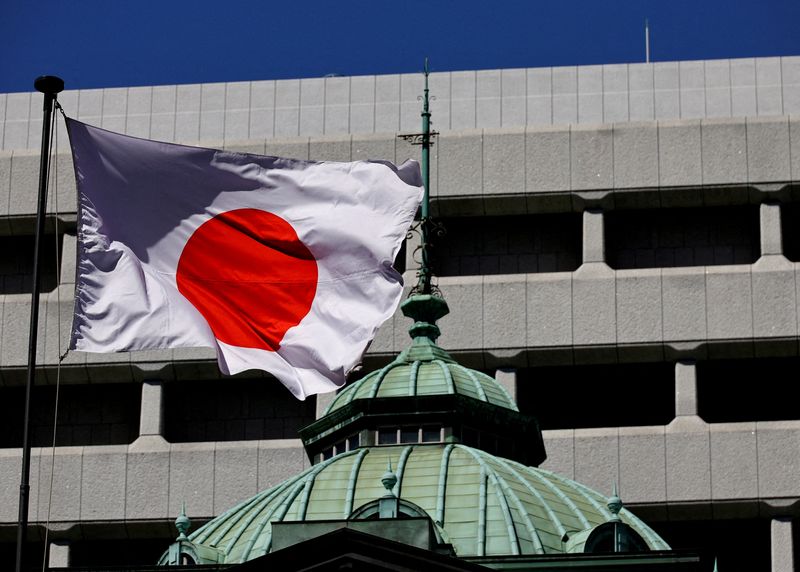By Leika Kihara
TOKYO (Reuters) - The Bank of Japan is setting the stage for an era of steady interest rate hikes by claiming victory in its long battle with deflation, sources and analysts say, in a major review of past policy that nods to significant consumer behaviour shifts.
The findings would highlight how the central bank is drawing a line under former governor Haruhiko Kuroda's radical monetary stimulus, and creating a new narrative to herald a return to more conventional policy that targets short-term interest rates.
The BOJ has said the review, which is governor Kazuo Ueda's flagship project that looks at the pros and cons of monetary easing steps taken in the past 25 years, won't have any implication for future monetary policy.
But the outcome, yet to be published in full, will present a paradigm shift for the central bank's ideas around inflation.
"The BOJ is using the idea of Japan's changing social norm to back up its projection that inflation will durably hit 2% in coming years - a prerequisite for rate hikes," said former BOJ official Nobuyasu Atago, who is currently chief economist at Rakuten Securities Economic Research Institute.
Two sources familiar with BOJ's thinking said the review will help the central bank make the case that Japan's economy can swallow the impact of a steady increase in current near-zero interest rates.
"The key message is that Japan's deflationary norm has changed," one of the sources said. "It's essentially saying that Japan is ready for higher rates."
Under Kuroda's "bazooka" stimulus deployed in 2013, the BOJ sought to shock the public out of a deflationary mindset with huge money printing and achieve its 2% inflation target in roughly two years.
What the experiment failed to achieve was ultimately accomplished by external factors like supply constraints caused by the pandemic and the war in Ukraine, which pushed up import costs and kept inflation above 2% for well over two years.
Now, the central bank is pointing to changes in the way households and companies behave to explain how, by the words of deputy governor Shinichi Uchida, "this time is different" in Japan's prolonged battle with deflation.
Japan is on the cusp of eradicating a "deflationary norm," or the perception held by households and firms that prices and wages won't rise much, Uchida said in a speech on May 27, describing labour market changes as structural and irreversible.
Indeed, while public perceptions are mixed, Japanese consumers appear to be shaking off a long-entrenched view established after the 1990s recession that prices would never rise again.
Aki Kuramoto, a 55-year-old office worker with two children, is bracing for an era where prices will keep going up.
"I think inflation would last for a while and product prices would rise further," she said while shopping at a supermarket in Tokyo. "We need to be prepared for that."
GEARING UP FOR CHANGE
The view on inflationary perceptions by Uchida, who spent most of his central banking career battling prolonged economic stagnation, reflects the review's broad thrust about structural changes in the economy, the sources said.
After experiencing decades of mostly flat or negative growth, core inflation has now stayed above the BOJ's 2% target for well over two years to hit 2.6% in June.
Gone are the days when companies were able to hire workers at near-zero wage growth. Faced with an intensifying labour shortage caused by a rapidly ageing population, Japanese firms delivered the biggest wage hikes in three decades this year.
"It's become much easier for companies to raise prices," said Yoshiki Shinke, chief economist at Dai-ichi Life Research Institute. "Whether this trend continues would depend on the strength of consumption."
The review also sheds light on the side-effects of past stimulus. In several studies conducted as part of the review, the BOJ said financial institutions' profitability fell sharply in the past 25 years as prolonged low rates hit margins.
The BOJ's review won't lead to a change in its 2% inflation target, or its policy framework that combines an assessment of its baseline economic scenario with that of financial risks.
But it does reflect the bank's resolve to take short-term rates to levels that neither cool nor stimulate growth - seen by analysts as somewhere between 0.5% to 1.5%.
While the full outcome of the review won't be released until later this year, some of the findings already released highlight progress Japan is making in achieving a cycle in which higher prices push up wages - a prerequisite for rate hikes.
A survey conducted on 2,509 companies released in May showed many of them see an economy where prices and wages both rise as being more favourable than one where both are stagnant.

Junya Oyama, a 56-year-old employee at an electronics manufacturer, said while his wage hikes have not matched general price increases, inflation for him is still tolerable.
"Young people might find it difficult to cope with rising prices, but higher prices are not giving me much trouble and are within the acceptable range."